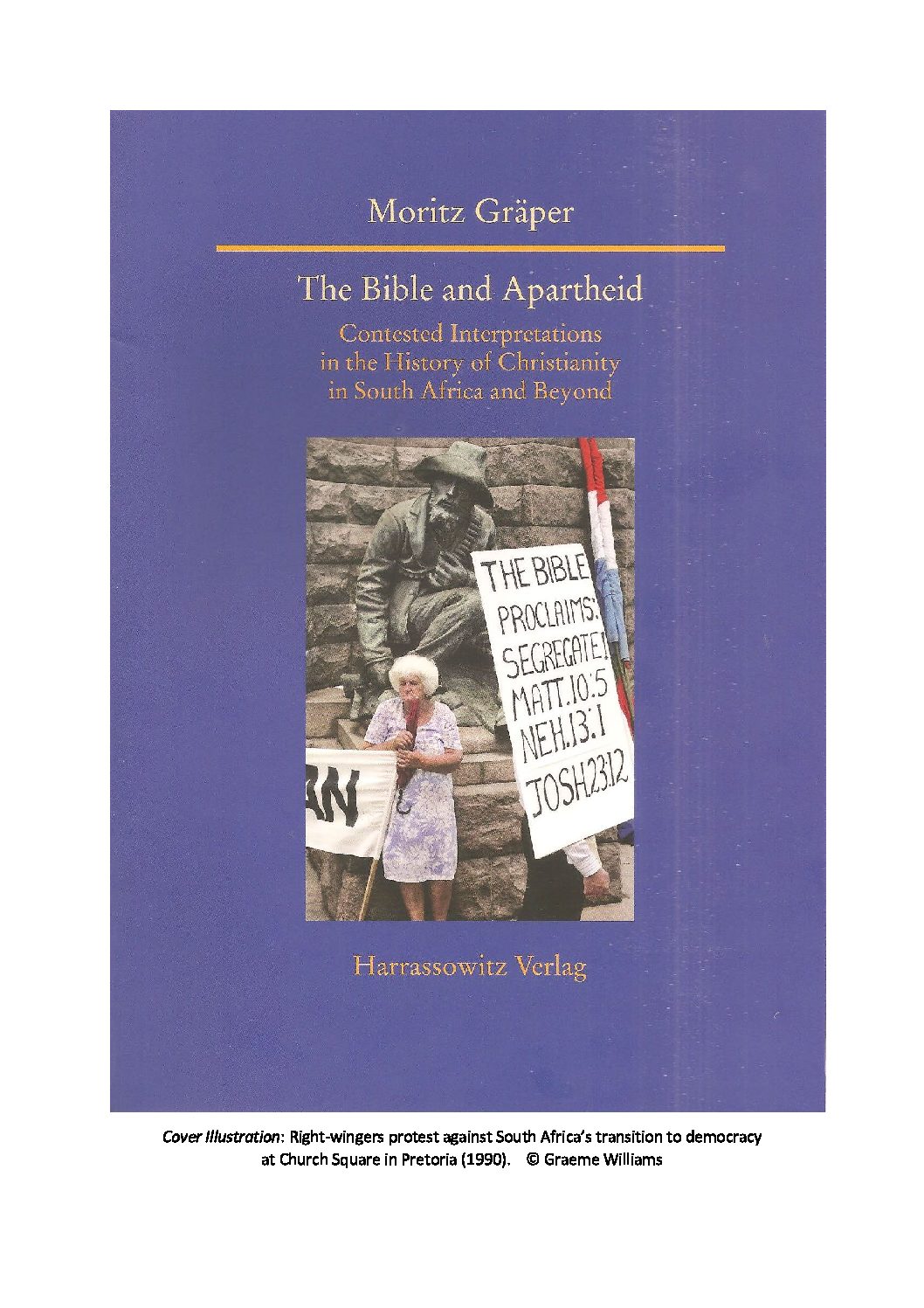Moritz Gräper:
The Bible and Apartheid
Contested Interpretations in the History of Christianity
in South Africa and Beyond
Wiesbaden: Harrassowitz Verlag 2019
ISBN 978-3-447-11222-2 (262 pages)
>> deutsch
The starting point of this book is the troubling insight that apartheid was a Christian project. Its theological justification was formulated by Christian theologians such as Totius or E.P. Groenewald. Even the segregated state-structure had been prefigured by Dutch Reformed church orders. At the same time the struggle against apartheid was led by many Christian actors such as Desmond Tutu or Allan Boesak. They opposed the racist system in South Africa and made arguments based on biblical interpretations.
This book analyzes the ambivalent role Christian actors played during apartheid. It is a study in the intersectionof biblical interpretation, hermeneutics, and history of Christianity in South Africa and beyond.
Dr. Moritz Gräper serves as vicar of the Evangelical Church of Westphalia (Germany). He used toresearch and teach at the University of Münster. His experience as a volunteer at a Lutheran chruch in Johannesburg as well as the encounter with Wolfram Kistner (1923-2006) and other time-witnesses of the struggle sparked his interest in the theological history of apartheid in South Africa.

[…] >> English […]
Strikingly in the introduction to the book two non/whites are mentioned as anti/apartheid activists, Desmond Turtu and Alan Boesak.
The fact of the matter is that it were white Afrikaners, like Prof Albert Geyser … and other theologians who made an end to apartheid.
Prof. C.J. Labuschagne
One of the dissidents.
Dear Professor Labuschagne, dear Liz Carmichael, dear respected commentators,
thanks for your reactions to my book. Regarding Prof. Labuschagne’s emphasis on the role of white Afrikaner theologians in the struggle, I would invite you to take a look at the contents of my study: Geyser, Naude, Keet and many others are, indeed, considered. However, in my view the role of Black Theology is not to be underestimated and as Ben put it, from my perspective the struggle was a joint effort of people of all population-groups. After all, an introductory text cannot name all relevant actors, but has to select. Desmond Tutu and Allan Boesak remain key-figures next to many others.
Considering Liz Carmichael’s point, I would agree that apartheid was a political project, but through its theological legitimization and its prefiguration in DRC church-structures and missiology, I believe it is appropriate to call apartheid a Christian project.
Kind regards,
Moritz
Dear Professor Labuschagne,
the people of South Africa – each and every one of them and all of them together – ultimately made an end to apartheid!
Ben Khumalo-Seegelken.
Dear Ben,
Actually – Apartheid was a political project, to which some DRC theologians then gave very thin theological cover, picking a very few OT passages out of context.
The rest of the Christian world consistently recognised these excuses as heretical, and finally in 1990 the DRC admitted that was the truth, and confessed that support for apartheid had been a sin.
With best wishes,
Liz
Dear Liz,
colonialism and mission have been an intimate couple from the very onset – long before the term “apartheid” was coined to name what later was to be identified and condemned by the international community as “crime against humanity”. Theological attempts to justify colonialism and apartheid are much older than the political system that the people of South Africa ultimately disowned and discarded when they started introducing and embarking onto democracy 25 years ago.
At the latest the Black Consciousness Movement and Black Theology in the 1960s and 1970s started spelling out what Moritz Gräper so accurately highlights through his recent publication.
Kind regards!
Ben.
Dear Liz Carmichael, dear Professor Labuschagne, dear respected commentators,
thanks for your reactions to my book. Regarding Prof. Labuschagne’s emphasis on the role of white Afrikaner theologians in the struggle, I would invite you to take a look at the contents of my study: Geyser, Naude, Keet and many others are, indeed, considered. However, in my view the role of Black Theology is not to be underestimated and as Ben put it, from my perspective the struggle was a joint effort of people of all population-groups. After all, an introductory text cannot name all relevant actors, but has to select. Desmond Tutu and Allan Boesak remain key-figures next to many others.
Considering Liz Carmichael’s point, I would agree that apartheid was a political project, but through its theological legitimization and its prefiguration in DRC church-structures and missiology, I believe it is appropriate to call apartheid a Christian project.
Kind regards,
Moritz
What about colonialism? It was also condoned by Christians of Europe. They needed a Hindu like Gandhi to end it.
Sears Appalsamy.
Mntungwa!
Ngingakuthokozela-ke ukufunda le ncwadi. Uma unayo, ngicela ungeboleke, Mntungwa. Ivele isikhona, futhi iyanda inkulumo enjena.
Philani.
NguNjabulo Ndaba
Ndodana!
Selokhu bafika abamhlophe nobandlululo nengcindezelo kwelakithi, basebenzisa nayo le ncwadi yokholo, iBhaybheli, bezama ukuzuza igunya lokuqhubeka nalobu bubi ababenzayo. Muva-nje, ngo-1948, base bebubiza ngokuthi yi-apartheid.
Emzabalazweni wethu kuBlack Consciousness Movement nakuBlack Theology, sasilwela ukukhululeka kwethu nokuthi sikhulule inkolo esifunda ngayo ebhaybhelini ekuthini isetshenziswe ngabacindezeli ngokuphambene nenjongo yayo – inkululeko nenhlalakahle emhlabeni jikelele!
Uzozifundela uzwe ukuthi le ncwadi ilubeka kanjani lolu daba.
Nani Niphile bo!
Yithi eKhaya/eJalimane